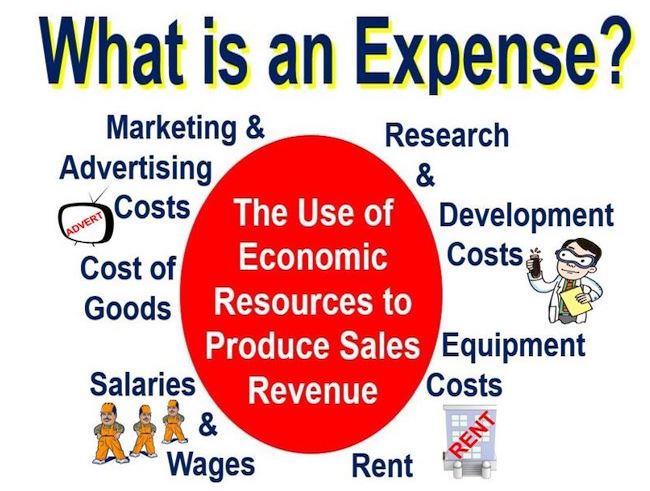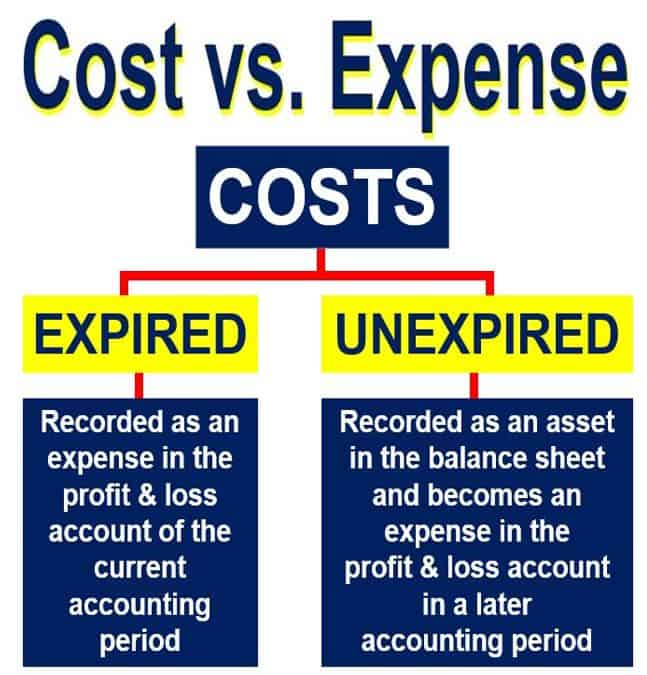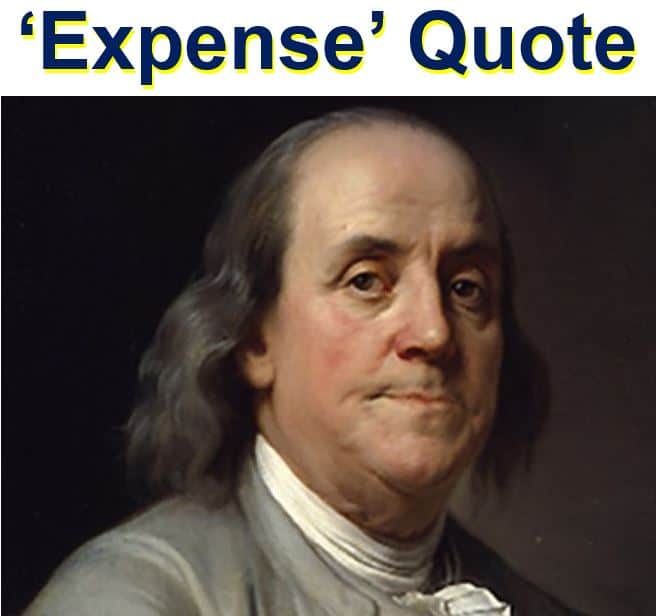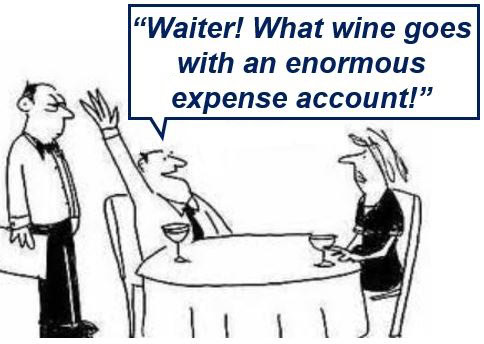What is an expense? Definition and meaning
An Expense or Expenditure is a cost during a specific accounting period that occurs as a business’ or organization’s operating activities. It is the amount of money that any entity has to spend on something.
In everyday English, the term refers to an outflow of money from a party to pay for a good or service, or for a category of cost. For a student tuition is an expense, for a tenant it is the rent.
Expenses are costs that are remitted or paid, typically in exchange for something of value. A high-expense good or service is ‘expensive’, while one that costs little is ‘inexpensive’.
 According to most tax authorities, a business expense has to be both necessary and ordinary. Ordinary means it is common or accepted in that sector, while necessary means it was needed or helpful in pursuit of making sales, i.e. earning income.
According to most tax authorities, a business expense has to be both necessary and ordinary. Ordinary means it is common or accepted in that sector, while necessary means it was needed or helpful in pursuit of making sales, i.e. earning income.
Expense: an outflow of money
Some of the likely expenses for an airline may include: the cost of tickets sold, commissions earned by travel agents, airport fees, rent for checking-in space at airports, the cost of utilities at its offices, money it spent on advertising, wages and salaries, the purchase of aircraft, the maintenance of its airplanes, etc.
Accounting Coach says that accountants and bookkeepers, under the accrual method of accounting, report expenses on the income statement for the accounting period when: 1. the cost is used up or expires, 2. the cost best matches the associated revenues, or 3. there is difficulty or uncertainty in measuring the future benefit.
For example, in an airline’s income statement for the month of March, it should report the cost of the tickets that were sold in that month – March – regardless of when cash was paid.
In double-entry bookkeeping, expenses are recorded as a debit to an income statement account (expense account), and a credit to either an asset account or a liability account – the balance sheet accounts. An expense increases liabilities and decreases assets.
 Like bananas and fruits, all expenses are costs, but not all costs are expenses.
Like bananas and fruits, all expenses are costs, but not all costs are expenses.
There are two main expense classifications:
-
Operating Expense
Sometimes abbreviated as OPEX, these are the expenses an organization or business incurs through its normal business operations including marketing, payroll, research and development, inventory costs, equipment, insurance and rent.
-
Non-operating Expense
Expenses that are not related to a business’ core operations, including amortization, and the costs of borrowing such as interest charges. Some accountants may remove non-operating expenses and non-operating revenues when they or the management want to examine the company’s performance excluding the effects of financing.
Expense in a cash flow statement
In a cash flow statement, expenses are divided into:
- Operating Expense such as salaries
- Financing Expense, interest expense for bonds and loans
- Capital Expenditure such as buying machinery and equipment
A major issue in accounting is whether specific expenditures should be classified as expenses – which one is reported straight away on the company’s income statement – or a capital expenditure, or a cost that is subject to depreciation, which is not an expense.
In accrual-basis accounting, these latter types of expenditures are posted as expenses when they are depreciated. The majority of large businesses use accrual-basis accounting. In accrual-basis accounting, expenses are matched with related incomes and/or are reported when the expenditure occurs, and not when the money is paid.
 “Gain may be temporary and uncertain; but ever while you live, expense is constant and certain: and it is easier to build two chimneys than to keep one in fuel,” (Benjamin Franklin, 1706-1790 – on of the Founding Fathers of the United States) (Image: cmuse.org)
“Gain may be temporary and uncertain; but ever while you live, expense is constant and certain: and it is easier to build two chimneys than to keep one in fuel,” (Benjamin Franklin, 1706-1790 – on of the Founding Fathers of the United States) (Image: cmuse.org)
In the context of personal finance, managing expenses effectively is crucial for budgeting and saving, as it helps individuals track their spending patterns and adjust their financial habits for better financial health.
What is an expense report?
An expense report is a document in which all the expenses that a person has incurred as a result of a business operation are included.
For example, if you go on a business trip abroad for a meeting, the cost of the flight, hotel, meals, taxis and other local transport costs, plus all other business-trip-related expenses that you have incurred will be added to the expenses report.
These expenses are tax deductible because they are considered business expenses.
Many companies benefit from automated expense reports systems for expenditure management. These software solutions can reduce the incidence of errors, fraud, and save a lot of valuable time.
All expenses are costs but not all costs are expenses, especially those incurred in acquisition of income generating assets.
 In November 2015, twenty-nine journalists took the European Parliament to court in the hope of making MEP’s (Members of the European Parliament’s) expenses more transparent. MEPs’ pay and expenses total over €474m each year, they claimed.
In November 2015, twenty-nine journalists took the European Parliament to court in the hope of making MEP’s (Members of the European Parliament’s) expenses more transparent. MEPs’ pay and expenses total over €474m each year, they claimed.
According to BusinessDictionary.com, an expense is:
“Money spent or cost incurred in an organization’s efforts to generate revenue, representing the cost of doing business.”
“Expenses may be in the form of actual cash payments (such as wages and salaries), a computed expired portion (depreciation) of an asset, or an amount taken out of earnings (such as bad debts).”
Expense as a verb
The term may also be used as a verb – however, it is not common. It can mean to offset as in offsetting an item of expenditure as an expense against taxable income:
“Up to $10,000 in capital expenditures can be expensed in the year they were incurred.”
It can also be used as a verb when meaning to pay for something in a certain way:
“I can expense the meal we had.”
At the expense of: can mean that somebody or something will suffer as a consequence of something, for example:
“Those jokes were said at the expense of John’s happiness,” (although the jokes were funny, John’s happiness suffered – he was a victim).
All-expenses-paid: this is a common expression, and is commonly used for a vacation to somewhere nice, as in:
“We won an all-expenses-paid weekend in London.”
Etymologists (people who study the origin of words) say the modern English word first appeared in Late Middle English. It came from Anglo-Norman French in an altered form of Old French espense ‘money provided for expenses’, which originated from Late Latin expensa (pecunia) ‘(money) spent’, which came from expendere ‘to pay out’.
Video – What is an Expense?
This video presentation, from our sister channel on YouTube – Marketing Business Network, explains what the meaning of ‘Expense’ is using simple and easy-to-understand language and examples.

